The pandemic dashed his restaurant dreams, so a fine-dining chef is taking his fried chicken to the streets
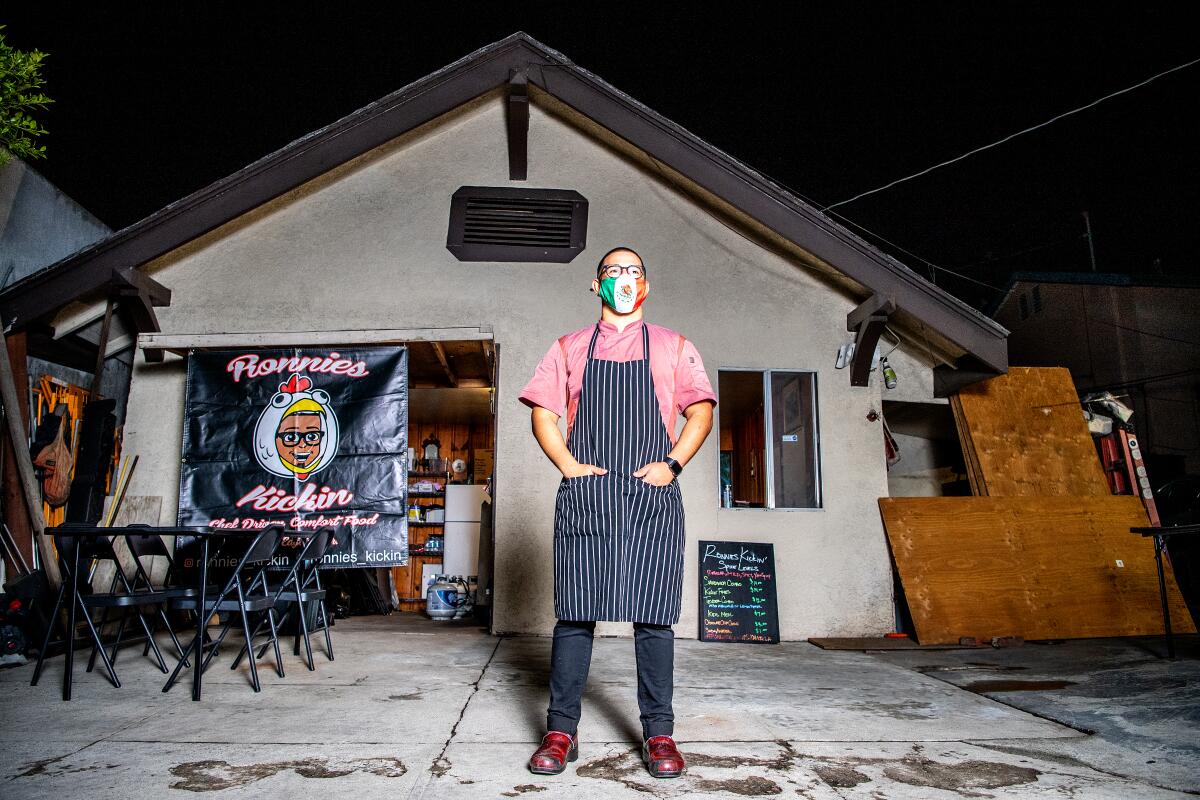
- Share via
After eight years cooking at some of L.A.’s finest restaurants, Ronnie Muñoz took a leap of faith.
Last January the 25-year-old chef quit his job at Craft, the Century City restaurant run by “Top Chef” judge Tom Colicchio, to focus his energy on Ronnie’s Kickin’, the spicy fried chicken sandwich pop-up he launched out of his South L.A. home.
Muñoz had spent much of 2019 juggling kitchen jobs and working to get his food stand off the ground; he felt confident 2020 would be his breakout year. Business at Ronnie’s Kickin’ was growing quickly, his culinary creations were blowing up on Instagram, and he was in talks with an investor about opening a restaurant in Mid-City.
But 2020, of course, had other plans.
In March, two weeks before Muñoz was scheduled to sign a lease on a restaurant space, the pandemic hit. Soon after, his investor pulled out, expansions plans were put on hold, and Muñoz was back selling chicken from his front yard.
“It was a tough situation, but weirdly it ended up being this great stress test, because it forced me to build the business in a different way,” he said on a chilly evening in December, peering out of the tiny one-car garage that until recently doubled as his kitchen.
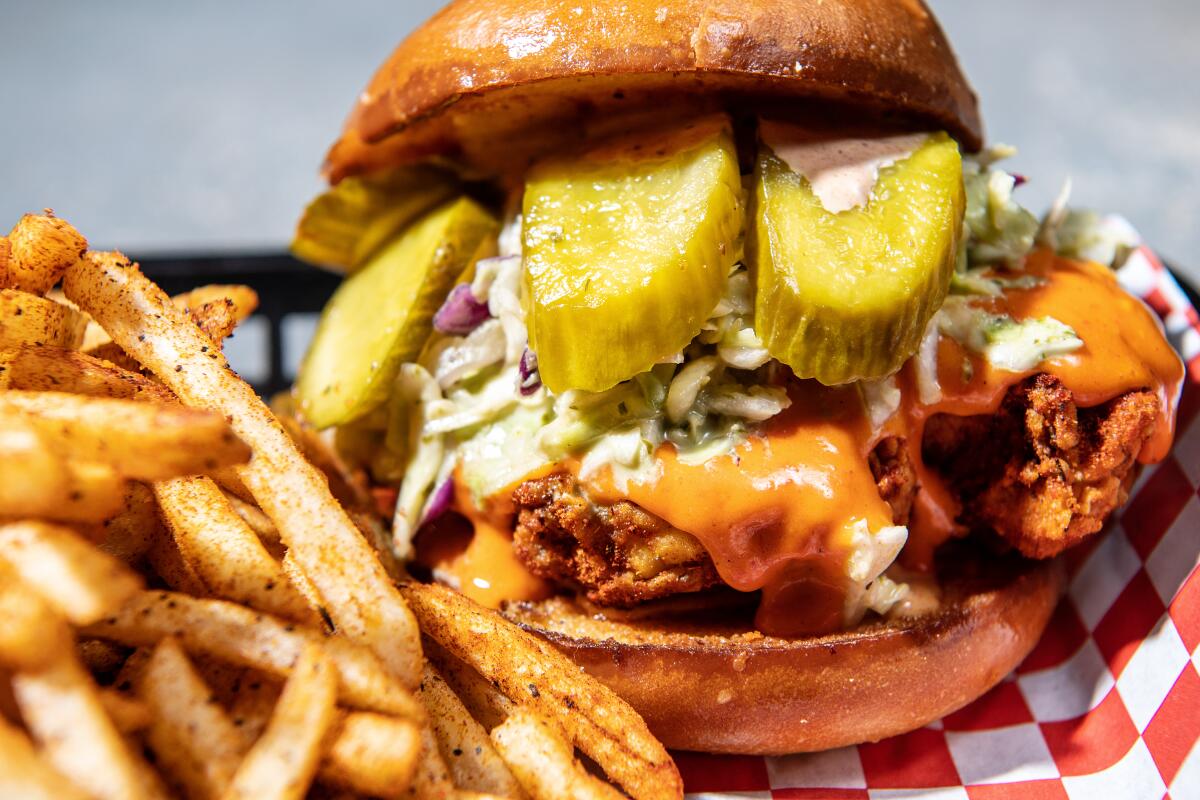
After a year filled with challenges, Muñoz has reason to be optimistic. He was able to save enough money to lease a food truck, and the new mobile iteration of Ronnie’s Kickin’ — with a menu he lovingly describes as “an elevated take on Buffalo Wild Wings” — launches Jan. 6.
“I’ve never worked out of a food truck before, but I’m ready to figure it out,” he said. “It’s a chance to spread the brand name to other parts of the city.”
Muñoz, who grew up in East Hollywood, has been cooking professionally since he was 17. Fresh out of high school, his earliest kitchen job was at new-wave pizzeria Stella Barra, where he worked as a line cook tossing pies.
From there he went on to cook at numerous L.A. restaurants, some of which have since closed: Paley in Hollywood, Mixed Company in Silver Lake, Testa in downtown L.A. and Yardbird in the Beverly Center. Soon he’d worked just about every position a young cook could take on, from garde manger to fish cook to pastry chef. Most recently he was a sous chef at Craft.
“I spent a lot of time helping other chefs open up restaurants, sort of freelancing at different places and picking up different skills,” he said. “I was always the guy behind the guy, so to speak.”
But as much as Muñoz enjoyed restaurant cooking, he was irked by the lack of dining options in Jefferson Park, the working-class neighborhood he and his brother Juan had moved to a few years earlier.
“I got tired of driving home after service and having nothing be open besides fast food,” he said. “That’s when I started thinking, ‘OK, how can I take the fancier foods I love to cook and create something that the neighborhood is going to connect with?’ That was the dream of the concept.”
A fried chicken sandwich seemed a good place to start.
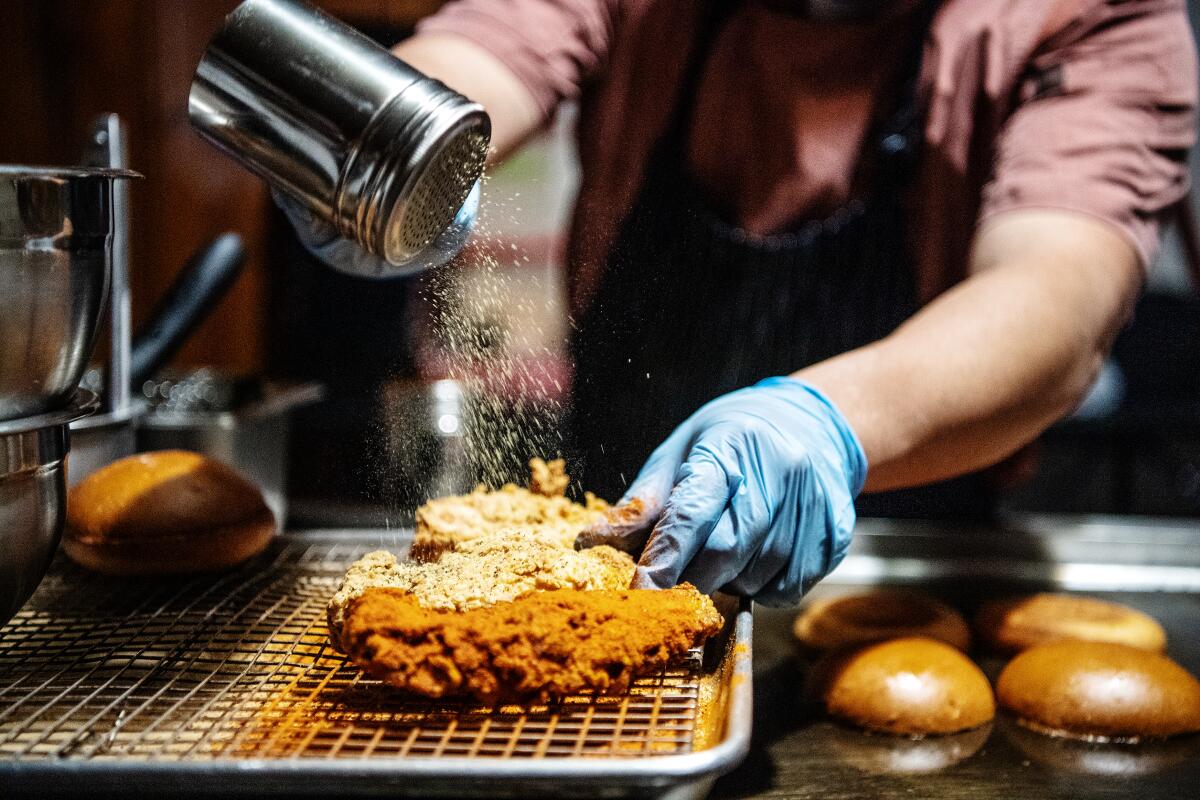
“I had friends who ran taco stands down the street, so I wasn’t going to serve fancy tacos out of my house,” he said. “What’s the next best thing that’s accessible and familiar? Fried chicken is this universal comfort food. I respect the Nashville hot chicken scene that is going on, but I wanted to do something different and put my own spin on it.”
He starts by brining the bird in herb-seasoned buttermilk overnight, then breads it in potato starch and flour so it develops a crunchy, shaggy crust when fried. But the real secret is the frying oil. Much like old-school McDonald’s, Muñoz fries everything at Ronnie’s Kickin’ in pure beef fat, which he says lends a deep umami flavor not replicated by anything else.
“It’s a pain to cook with sometimes and it’s not cheap, but the flavor is completely worth it,” he said.
The fried chicken then gets coated in a hot-but-not-too-hot spice blend that Muñoz makes with dried habaneros. Then he piles it on a Larder Baking Co. brioche bun, topped with a Calabrian chili aioli, coleslaw and homemade dill pickles. A heaping mound of herbs-de-Provence-seasoned fries — also cooked in beef fat — comes on the side, all for $14.
Powered by a half-dozen commercial deep fryers, his menu has since expanded to include tempura-fried pickles; chicken tenders tossed with an “al pastor” spice blend or lemon pepper seasoning (made from dehydrated lemon zest); loaded fries and quesadillas; and honey-marinated naked wings, which come with a tangy mustard barbecue sauce for dipping.
Muñoz puts his pastry skills to use too, with desserts such as fried apple pies, beignets with brown butter powder, gooey salted chocolate chip cookies and made-from-scratch sourdough conchas.
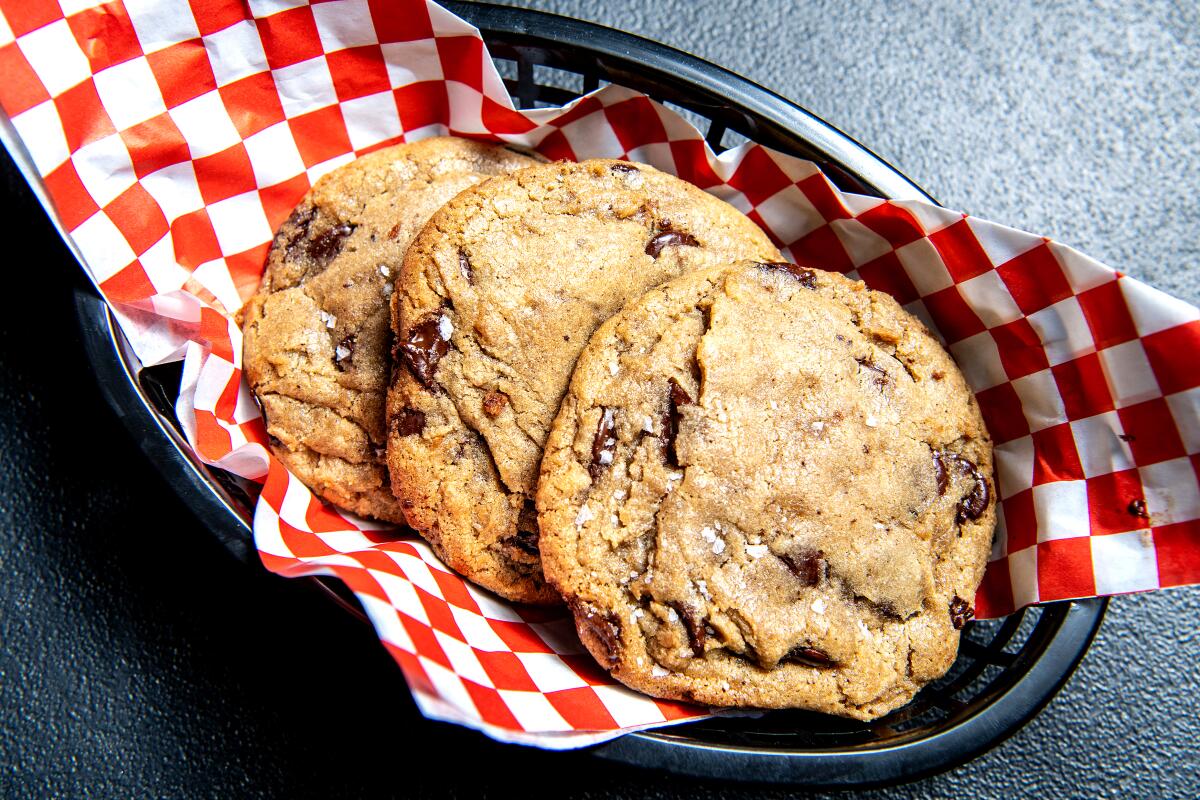
“My dad is from Mexico and my mom is from El Salvador, so I think customers expect me to weave in those flavors, even if I’m not serving straight-up Latino food,” he said. “I’m always creating, always trying out new dishes, because I find that is what keeps customers interested.”
Before the pandemic, neighbors would gather around outdoor tables eating dinner while Muñoz and his crew, clad in custom embroidered chef jackets, cooked to their favorite cumbia tracks. It felt like a real neighborhood restaurant, he said.
Muñoz said that while he’s thankful to be moving Ronnie’s Kickin’ to a food truck — no more dealing with the occasional disgruntled neighbor — he felt a twinge of sadness when he closed down in December.
“I think what attracted some people was that I was just some dude cooking in his yard. I got to hang out with my neighbors and make food for them,” he said. “Plus, I’m going to miss, like, walking two minutes from my room to work.”
Though he still hopes to open a full-service restaurant in the future, Muñoz said that his experience over the last year has made him realize how much trial and error comes with moving from restaurant cook to restaurant owner. He regularly posts about those business lessons — from managing operational costs to setting up accounts with wholesale suppliers —on his Instagram account, @ronnies_kickin.
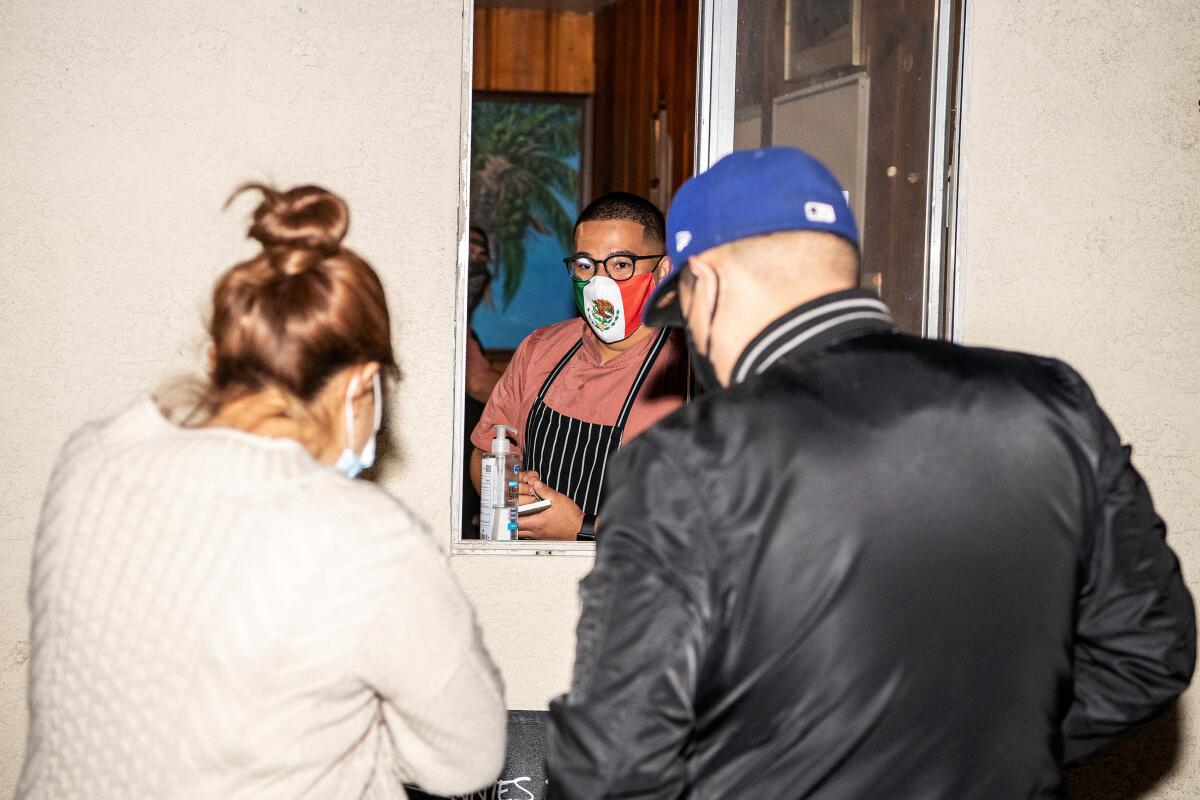
“Cooks are spread so thin, we’re always looking for the next best thing. Maybe you make $15 an hour at one place, but this brand-new restaurant is going to pay you $15.50, so you go there. It becomes this endless cycle, and you’re less able to take a risk and build something for yourself,” he said.
“I was able to save up enough to open a food stand, but not everyone has that opportunity. So how can I support my staff and other people in the industry so that they can eventually do that?”
Muñoz spent about $10,000 to launch his food truck and signed a yearlong lease at $3,000 a month, hoping that by the end of 2021 opening a full-service restaurant might be more viable.
Until then he and his longtime sous chefs, José Gamboa and Benito Giles, will have to adapt to cooking in a cramped mobile kitchen and attracting a new audience using social media. Muñoz estimates he’ll need to earn $15,000 to $20,000 in revenue each month before he breaks even.
“There’s a learning curve when opening a food truck, because now you have to meet people where they are, instead of them coming to you,” he said.
Ronnie’s Kickin’ is booked for early January pit stops at craft beverage shops such as Sara’s Market in Boyle Heights and Hi-Lo Liquor in Culver City.
And once bars, wineries and breweries are allowed to reopen, he plans to partner with businesses that due to COVID-19 restrictions are required to have an on-site food vendor in order to offer alcohol service.
“When you specialize in fried foods, it’s smart to be near places where drinking is happening,” he said.
More to Read
Eat your way across L.A.
Get our weekly Tasting Notes newsletter for reviews, news and more.
You may occasionally receive promotional content from the Los Angeles Times.








